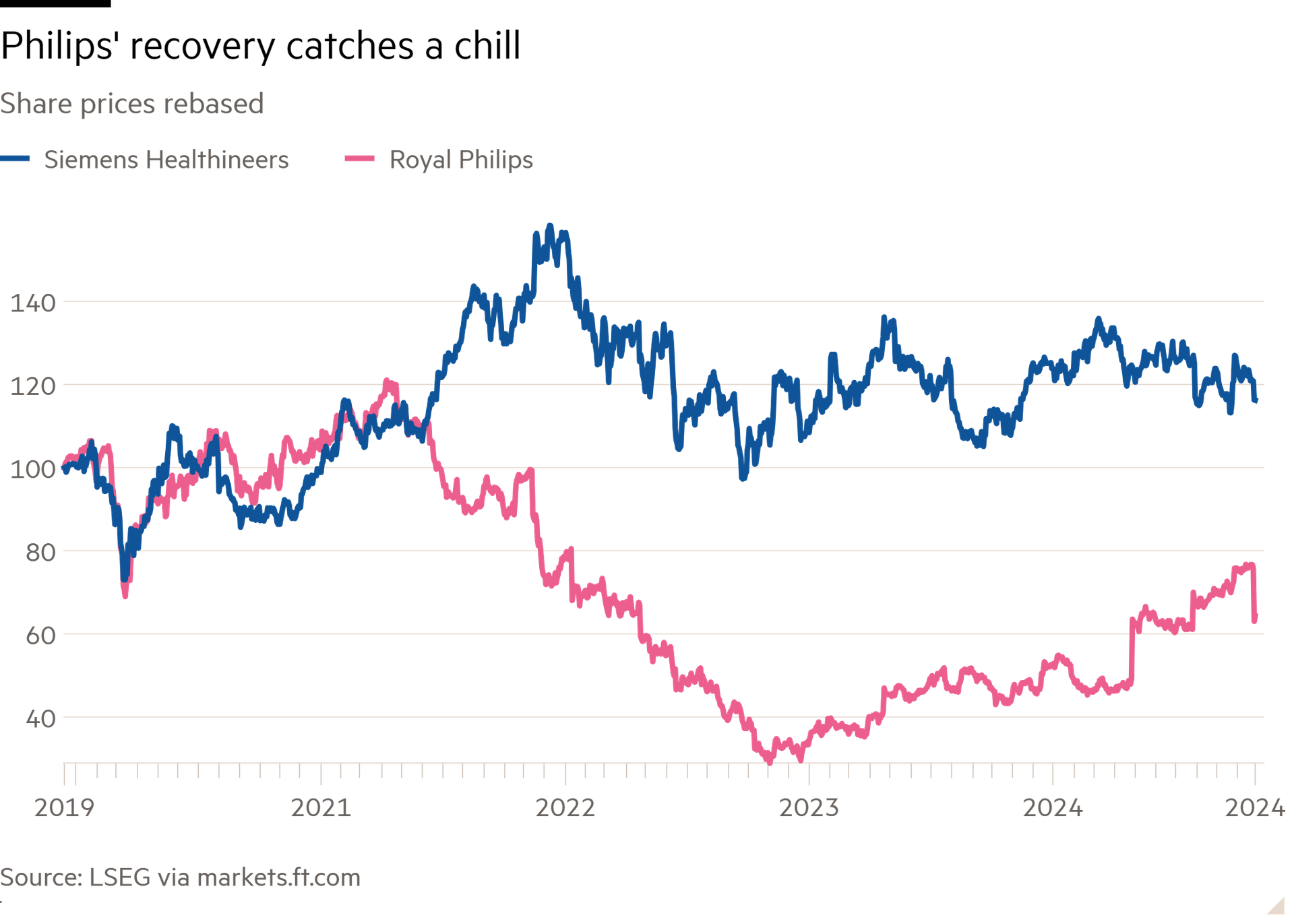尊敬的用戶您好,這是來自FT中文網的溫馨提示:如您對更多FT中文網的內容感興趣,請在蘋果應用商店或谷歌應用市場搜尋「FT中文網」,下載FT中文網的官方應用。
Some companies, it seems, receive the benefit of the doubt even if their performance is a little ho-hum. They can, for example, highlight weak Chinese demand and get away with a mere share price ripple. Other stocks take a razor-sharp cut on every lump and bump.
有些公司似乎即使業績平平也能得到寬容。例如,它們可以強調中國需求疲軟,而只受到股價微小波動的影響。而其他股票則在每一次起伏中都遭受嚴重打擊。
Philips is a case in point. Investors in the Dutch healthcare conglomerate, which makes everything from diagnostic machines to electric shavers, had until this week been enjoying a restorative patch. Legal woes over malfunctioning sleep apnoea machines had been resolved faster and more cheaply than feared, and sales seemed to be heading in the right direction.
飛利浦是一個典型的例子。這家荷蘭醫療集團生產從診斷儀到電動剃鬚刀的各種產品,其投資者直到本週都過得不錯。有關睡眠呼吸暫停症設備故障的法律糾紛解決得比預期更快更便宜,銷售似乎也在朝著正確的方向發展。
But a stumble has undone much of the progress. Philips’ stock has fallen 15 per cent since it released soft third-quarter results on Monday. While Italy’s Agnelli family — who made a big investment in the stock in August 2023 through their public vehicle Exor — is still in the money, this week marks a blow for those who had more recently got behind Philips’ turnaround story.
但一個岔子使大部分進展付諸東流。自週一發佈疲軟的第三季度業績以來,飛利浦股價下跌了15%。雖然義大利的阿涅利家族——在2023年8月透過他們的上市公司Exor對該股票進行了大量投資——仍在獲利,但本週對那些最近相信飛利浦扭虧爲盈的人來說是一個打擊。

Investors must be wondering what exactly hit them. The issues Philips highlighted at third-quarter results are hardly unheard of. An anti-corruption drive at Chinese hospitals is slowing procurement of diagnostics machines — a headwind that drove guidance downgrades at rivals Siemens Healthineers and GE Healthcare after second-quarter results, points out Lisa Clive at Bernstein. And while a double-digit fall in personal care sales in China is surprising in its magnitude, the weakness of Chinese consumer demand has been widely flagged across industries.
投資者一定想知道到底是什麼打擊了他們。飛利浦在第三季度財報中強調的問題幾乎聞所未聞。伯恩斯坦公司的麗莎•克萊夫指出,中國醫院的反腐敗運動正在減緩診斷設備的採購,這一逆風導致競爭對手西門子醫療和奇異公司醫療在第二季度業績後下調了指導。儘管中國個人護理銷售額兩位數的下降幅度令人驚訝,不過各行各業都能看到中國消費者需求的疲軟。
Meanwhile, results outside China are strong. Operating margins remain healthy despite slower than expected sales. Philips does not look expensive, either. It trades on 15 times next year’s — reduced — earnings expectations despite double-digit EPS growth through to 2026, on Barclays estimates. Siemens Healthineers trades on more than 19 times.
與此同時,中國以外的業績表現強勁。儘管銷售成長速度低於預期,但運營利潤率仍保持健康。飛利浦看起來也不貴。根據巴克萊的預測,儘管到2026年,飛利浦的每股收益將實現兩位數成長,但其交易價格是明年預期收益——下調後——的15倍。而西門子醫療的交易倍數超過19倍。
The best explanation for the share price reaction is that Philips is suffering from sticky negative sentiment, a malady that can afflict companies that have severely spooked the market in recent history.
對股價反應的最佳解釋是,飛利浦正遭受著粘性負面情緒的困擾,這種疾病可能會困擾那些在近期嚴重驚嚇市場的公司。
Curing it requires not just solving one problem, no matter how major. It requires solving all of them. That’s something that GSK, reporting on Wednesday, will be acutely aware of. Following the resolution of the Zantac heartburn medicine legal overhang, analysts are now fretting over the strength of its vaccine sales.
要治好這種病,就不能只解決一個問題——不管它有多麼重大——而是需要解決所有問題。週三發佈報告的葛蘭素史克公司將深刻認識到這一點。在解決了善胃得(Zantac)治療胃灼熱藥物的法律糾紛後,分析師們現在又開始擔心其疫苗銷售的實力。
Traumatised investors require a long period of peace and quiet to recover their composure. Philips cannot afford another jolt to their nerves.
飽受創傷的投資者需要長時間的平靜才能恢復冷靜。飛利浦不能再讓他們神經緊張了。